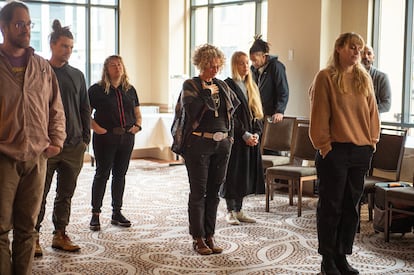Psychedelic therapies make inroads in the American West
In several states, compounds in hallucinogenic mushrooms are being used to treat Parkinson’s, bipolar disorder, chronic pain and other diseases


Psilocybin – a compound in hallucinogenic mushrooms – is taking the Western United States by storm in 2023.
On January 2, the state government of Oregon began receiving applications from those interested in administering and receiving psychedelic therapies. The state became the first to legalize the chemical in 2020, allowing anyone over the age of 21 to consume the mushroom-derived drug (under supervision) in a special center. The regulation does not yet allow wholesale or recreational use.
After two years of testing and developing a plan, the state’s Psilocybin Services Office has finally started tackling the paperwork to expand this program. The first licenses for new centers will soon begin to be issued. More than 4,000 patients have already shown interest in the properties of the drug for the treatment of addictions, depression, post-traumatic stress disorder, Parkinson’s, Alzheimer’s, bipolar disorder and chronic pain, among other diseases.
The substance – which can be found in various types of mushrooms and causes vivid hallucinations – has embarked on the same journey that marijuana began in 1996, when California legalized it for medicinal use. Both marijuana and psilocybin remain federally illegal in the United States, but this hasn’t stopped states and cities from starting to decriminalize them, following Canada’s lead. For instance, last November, Coloradans voted to legalize the drug, which will be available to everyone 21 and older within two years. In 2014, Colorado became the first American state to legalize marijuana for recreational use.
This advance is part of a global movement to restart research into psychedelic substances. For the past five years, experts have picked up on studies that were abandoned in the 1970s, when the Nixon administration began a crusade against drugs. There are many studies currently underway – with very promising results – designed to see if hallucinogens can be effective to treat mental health pathologies. However, the research is not robust enough for these substances to be approved as medicines in most cases.
Natural Medicine Colorado was the organization that initiated the collection of signatures to carry out the pro-psilocybin referendum in the state. Several military veterans have since become allies of psychedelic mushroom therapies after seeing some of the benefits.
“Psilocybin therapy helped me when nothing else worked,” says Luke R. Gruber, a former Marine who fought the Taliban in Afghanistan. When he returned home from serving, he began to deal with psychological problems: depression, anger and post-traumatic stress disorder. He also had suicidal thoughts. Many fellow returning soldiers in Colorado were taking their own lives.
“I could have been one of them,” he confessed, in a testimony for Natural Medicine. The pills – which include small traces of hallucinogenic fungus – helped him “break the cycle of pain and negative thoughts.”
At the moment, the FDA doesn’t consider psilocybin to have medicinal properties. But this position could be changing, writes Juliana Mercer, an ex-Marine based in San Diego, who communicated with EL PAÍS via email: “This substance – along with MDMA – are in the third stage of FDA clinical trials. We will continue fighting so that all veterans and ex-military personnel can have access to this treatment that changed my life.”
California – the largest market for drugs in the United States – could soon see the decriminalization of all plant-based psychedelics, such as psilocybin and DMT, the active ingredient in ayahuasca. State Senator Scott Wiener, a progressive Democrat from San Francisco, has brought a bill before the legislature to achieve this. However, his proposal faces stiff opposition from Republicans, conservative Democrats and police associations. Similar legislation has been voted down in the past.
“These drugs save lives and are present in very promising treatments,” Wiener said when he introduced the bill. Some cities in California – such as San Francisco, Santa Cruz and Oakland – have already decriminalized natural psychedelics. The municipal government of Seattle – the largest city in the state of Washington – also removed these substances from the prohibited list in 2022. In the east of the US, it has been done by the city of Ann Arbor, Michigan. All of these aforementioned cities are left-leaning Democratic strongholds.
In May 2022, the Substance Abuse and Mental Health Services Administration (SAMHSA) responded to a congresswoman who asked the Biden administration for information about the use of psilocybin in treatments for PTSD and depression. The response – obtained by Madeleine Dean, a Democratic representative from Pennsylvania – showed that the government is creating a working group that will track the rise in such treatments. Field teams have already been launched in conservative states – such as Texas and Utah – where there is a mental health crisis. The Maryland state government has also promised a million-dollar grant to bolster research in this field.
“SAMHSA agrees that too many Americans are suffering from mental breakdowns and are abusing substances. The potential for psychedelic-assisted therapies to address this crisis should be explored,” wrote Secretary of Health Xavier Becerra in a statement.
Researchers have expressed confidence that the FDA’s go-ahead will come within the next two years. In 2022, the federal regulator gave its approval to the University of California at Berkeley – a pioneer in research involving psychedelic substances – to carry out studies with these drugs.
The supposed benefits of mushroom therapies have multiplied in recent years. Last summer, the Journal of the American Medical Association published the results of a study of 93 people with drinking problems. One group took pills with 25 milligrams of psilocybin – the other took a placebo. After ingesting the capsules, the participants’ eyes were covered with a blindfold. They were asked to lie down in an armchair, while music was played through headphones. In total, there were 12 sessions that were complemented with traditional therapy.
The results show that, eight months after taking the drug for the first time, those who took the capsules with psilocybin were able to reduce their alcohol consumption “robustly and sustainably.” Study author Michael Bogenshcutz – a physician with NYU’s Department of Psychiatry – said that nearly half of those who took the drug were able to achieve progress, while in the control group – dependent entirely on talk therapy – the figure was far lower, at 24%.

Bogenschutz believes that the active substance improves neural connections, at least temporarily.
“[With psilocybin], more parts of the brain can talk to other parts of the brain,” says the doctor. In more than 20 years, no new drug has been approved to treat alcoholism. Only three drugs are known to reduce alcohol dependence.
Similar studies have yielded positive results in the treatment of depression. In one, doctors offered psilocybin capsules to 233 adults in North America and Europe. The results – published in the New England Medical Journal – showed that the higher the dose, the better the outcome. After the first three weeks of sessions – each lasting between six and eight hours – 37% of the patients with higher doses presented improvements in their symptoms. But the result did not have a lasting effect: after three months passed, several of the problems returned.
Those behind the study – including Compass Pathways, a publicly traded London-based firm seeking to develop psilocybin for commercial use – have announced that they will conduct a larger-scale study to achieve more accurate results.
Sign up for our weekly newsletter to get more English-language news coverage from EL PAÍS USA Edition
Tu suscripción se está usando en otro dispositivo
¿Quieres añadir otro usuario a tu suscripción?
Si continúas leyendo en este dispositivo, no se podrá leer en el otro.
FlechaTu suscripción se está usando en otro dispositivo y solo puedes acceder a EL PAÍS desde un dispositivo a la vez.
Si quieres compartir tu cuenta, cambia tu suscripción a la modalidad Premium, así podrás añadir otro usuario. Cada uno accederá con su propia cuenta de email, lo que os permitirá personalizar vuestra experiencia en EL PAÍS.
¿Tienes una suscripción de empresa? Accede aquí para contratar más cuentas.
En el caso de no saber quién está usando tu cuenta, te recomendamos cambiar tu contraseña aquí.
Si decides continuar compartiendo tu cuenta, este mensaje se mostrará en tu dispositivo y en el de la otra persona que está usando tu cuenta de forma indefinida, afectando a tu experiencia de lectura. Puedes consultar aquí los términos y condiciones de la suscripción digital.








































